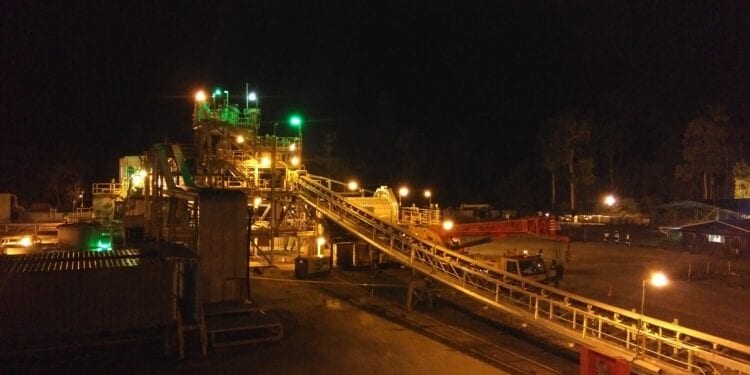Major Step Forward Towards Stage 2 Growth In PNG
K92 Mining Inc. (TSX: KNT) has taken a significant step forward towards ramping up to run-rate Stage 2 Expansion throughput at its Kainantu Gold Mine in Papua New Guinea.
During the first quarter Kainantu delivered record mill throughput of 73,221 tonnes processed, including six consecutive weeks averaging ~1,000 tpd in January and February, with 18 days exceeding 1,100 tpd, eight days exceeding 1,200 tpd, and a daily record of 1,315 tpd over this period. This was achieved despite multiple short-term challenges:
The strong performance came despite the fact that in mid-January until the end of February, the operation was impacted by a shortage of bulk emulsion explosives due to unforeseen COVID-19 international shipping logistical issues, compounded by increasing global transport restrictions as a result of the Beirut Incident.
The operation addressed this shortage by: i) implementing alternative but less optimal explosives (ANFO and packaged explosives), which impacted productivities for stoping and development, and; ii) supplementing mill feed from lower grade stockpiles.
By late February, a significant shipment of bulk emulsion explosives arrived on site. The supplier has diversified sources and is expected to commence domestic production in May, nearby in Lae, to totally mitigate this issue.
Secondly, in March, the operation was impacted by an incident involving an underground loader, which prevented backfilling operations for approximately three weeks. This resulted in production from four high grade stopes being deferred to the second quarter, and the plant treating a significantly larger amount of lower grade stockpile material during the first quarter in addition to a non-optimal mill feed head grade blend in March that impacted recoveries and throughput.
Stoping operations and mining of high-grade stopes recommenced in late March. Additionally, on March 17, 2021, the Government of Australia announced a temporary short-term restriction on travel between Papua New Guinea and Australia due to COVID-19. The restriction included the suspension of movement of the resource sector’s expatriate fly-in fly-out workforce between Papua New Guinea and Australia.
The company has engaged with the Australian Government through the PNG Chamber of Mines and Petroleum on the re-establishment of FIFO movement and at this point anticipates that restrictions to be lifted by the end of April. These events are not expected to impact K92 meeting its production guidance for 2021.
In Q1, mining operations focused on Kora’s K1 and K2 veins and Judd’s J1 Vein, for a total of 7 levels mined. Mining of Kora was conducted on the 1150, 1170, 1185, 1225, 1245 and 1265 levels and Judd on the 1235 level. Importantly, Q1 marked the fourth full quarter of long hole stoping (modified AVOCA method), which commenced in March 2020 on the K1 vein. Long hole stoping has continued to perform to design for both the K1 and K2 veins. The combination of additional levels developed through 2020 and Q1 2021 and strong performance from long hole stoping has provided a notable positive impact on operational flexibility.
The new twin incline development made considerable progress in Q1 with the #2 (6m x 6m) incline now advanced 363 metres and the #3 (5m x 5m) incline advanced 370 metres as at March 31, 2021. Focus on the twin incline was reduced after the COVID-19 Papua New Guinea and Australia travel restrictions were initiated.
Following the establishment of a comprehensive COVID-19 Management Plan, the Kainantu Mine has continued to operate during the pandemic, with a significant focus on health and safety and risk-mitigation.
Under the COVID-19 Management Plan, K92 established a Government recognised testing lab facility utilising qualified medical personnel on site, quarantine and isolation facilities for incoming staff, and implemented enhanced hygiene, disinfecting and training systems and procedures.
Additional protocols include a requirement for external COVID-19 testing prior to travel to quarantine at site. The company’s first priority is to protect the health and well-being of our personnel and local communities.











